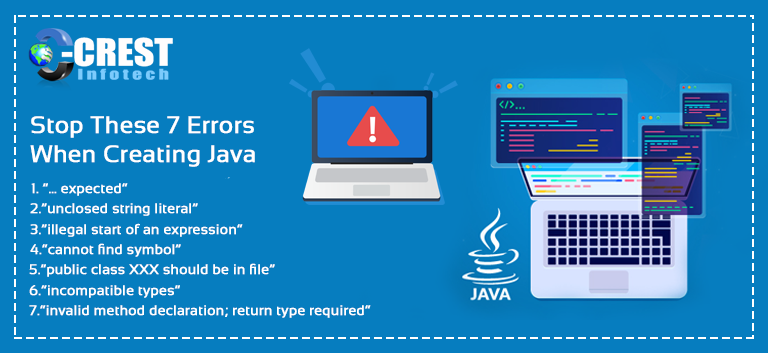Java has grown in popularity as a programming language for software development. Despite the fact that Java is more common among developers than C or C++, it still has flaws. Here are seven Java programming blunders to watch out for and how to stop them.
Forgetting To Put “Break” In the Code
Forgetting the ‘break’ component of the code can be harmful to your coding,” says Austin Moulden, a software writer at Paper Fellows and an Australian helper. “Because forgetting that part in the code can trigger the programme to write ‘Zero’ followed by ‘One,’ and will go through the entire ‘switch’ sentence before it eventually reaches a ‘break. And then allowing the error to go unnoticed before it causes harm to your code in development. As a consequence, remember to use the “split” keyword whenever it’s required in the code.”
Not Using Closing Curly Braces
Curly braces are used in coding to open and close codes (the and and ). Many developers, particularly newcomers, have a habit of forgetting to close their codes with the closing curly brace. Despite the fact that the compiler and modern IDEs can easily detect this error, programmers must always keep an eye out for missing closing braces.
Leaving The Door Open To Memory Leaks
Just because Java uses automatic memory management, doesn’t mean that it’s perfect when saving memory.
Memory allocations can be vulnerable to memory leaks. The garbage collector can’t get rid of objects if they still have references to them, which is a problem with persistent object references.
These references are made by defining a class that has a static field that contains specific objects. If that field is not set to null after the array is “thrown away,” it will never be retrieved. A memory leak may also refer to a collection of artefacts that refer to each other, creating circular dependencies and perplexing the garbage collector as to whether or not they’re required. Memory leaks may cause artefacts to absorb memory in either case. Use the “pollLast” method to avoid memory leaks by returning the element and removing it from the deque.
Leaving Exceptions Unhandled
Another blunder in Java development is failing to manage exceptions. Although it should be tempting to disregard exceptions, it is preferable to deal with them. Instead of ignoring anomalies, consider the following:
- Exceptions are thrown again.
- OR you can add a message to the log.
- displaying an error message to the customer
These acts warn other developers as to why the exception was not treated.
Confusing (==) For “.equals” When Comparing Something
Despite their apparent resemblance, the == operator and the equals() method are not the same thing.
The == operator explicitly compares two artefacts.
The equals() method makes a semantic comparison between two objects (their data).
Only use the == operator when comparing two items directly. Otherwise, when comparing two items meaningfully, use the equals() form.
Not Parametrizing Generic Types
Since raw types are neither parametrized nor static members of class R, generic types win (in other words, not inherited from the superclass or super-interface of R). Generic programming has enhanced Java to the point that it is parametrized and safe for necessary information not to be accidentally hidden in code since version 1.5. Even though compilers can detect errors in raw types, it’s still a good idea to use standardised types so that anomalies are caught early and the type system isn’t broken.
Disobeying Contracts
Jorja Gilfillan, a business blogger at Essay roo and State of writing, says that contracts for codes – whether from the standard library or from a third-party vendor – are accessible for developers to respond to. “Like something else, developers can obey a set of guidelines when it comes to coding.”
Disobedience of contracts may have beneficial effects on occasion, but it typically has the following negative consequences:
- Production is jeopardised by erroneous code.
- UI misbehaviour
- Inaccurate data reports
- Loss of data
- Performance issues with the application
“It’s best to obey contracts to the letter,” Gilfillan adds, “so that nothing within the code is jeopardised.” Even if some errors seem to be harmless at first sight, don’t let them get the best of you.”
Like every other programming language Java, has advantages and disadvantages.
Your best bet is to recognise and correct any Java development errors in your code as soon as possible so that it can run smoothly.
You can also Hire Laravel Developer and Hire PHP Developer. Contact Crest Infotech to know more about Dedicated Development services in Details.



